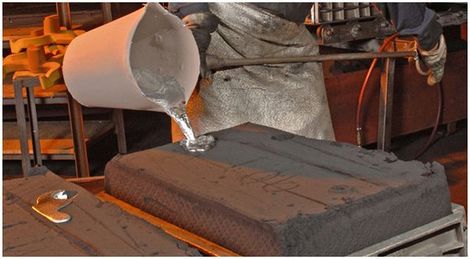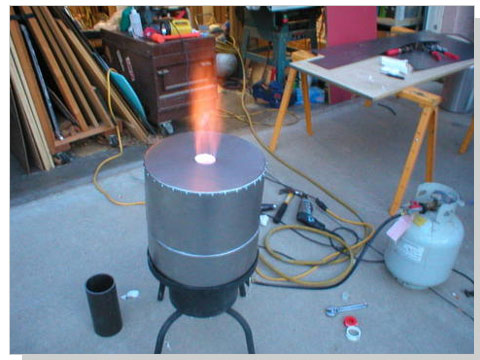Leading processes that define successful Metal Casting results
Exactly How a Metal Foundry Adds to Lasting Metal Production Practices
Metal foundries play a necessary duty in advertising sustainability within the metal production market. By incorporating recycled materials, they minimize dependence on virgin sources and lessen environmental effects. Energy-efficient melting procedures better minimize energy consumption and discharges. The trip toward sustainable techniques entails more than simply recycling and energy management. It includes a more comprehensive dedication to ethical sourcing and cutting-edge innovations. The effects of these techniques are substantial and warrant more detailed exam.
The Duty of Recycling in Metal Foundries
While metal manufacturing has typically relied upon virgin materials, the enhancing emphasis on sustainability has led to a substantial change in techniques, specifically in metal foundries. Recycling has actually become a crucial part of this improvement, enabling foundries to repurpose scrap metal and reduce reliance on mined sources. By incorporating recycled materials into their procedures, foundries not just decrease ecological effect but also reduced manufacturing expenses.
Making use of recycled metals, such as light weight aluminum, steel, and copper, reduces energy intake and minimizes greenhouse gas emissions connected with conventional mining and refining approaches. Foundries can achieve top quality outputs by using advanced sorting and handling modern technologies to guarantee the pureness of recycled products. This focus on reusing fosters a round economy, where waste is reduced, and resources are made use of effectively. As a result, metal foundries play a crucial function in advertising lasting techniques within the metal production market.
Energy-Efficient Melting Techniques
Energy-efficient melting strategies are important for improving sustainability in metal production. These strategies substantially decrease power consumption during the melting process, which is just one of the most energy-intensive phases in metal production. Technologies such as induction melting, resistance heating, and microwave melting offer boosted effectiveness contrasted to conventional methods. Induction melting, for circumstances, makes use of magnetic fields to produce warm straight within the metal, minimizing energy loss and offering exact temperature level control.
In addition, executing warmth recuperation systems can better enhance efficiency by recording and recycling waste warm produced during melting. Utilizing advanced insulation materials and optimizing heater styles likewise add to power savings. By embracing these cutting-edge melting techniques, metal foundries can lower their carbon impact, lower functional expenses, and add to a much more sustainable manufacturing landscape. The assimilation of energy-efficient techniques not only aligns with environmental objectives yet likewise meets the expanding need for liable manufacturing methods in the metal market.
Sustainable Sourcing of Raw Products
Sustainable sourcing of resources is important for minimizing the ecological impact of metal production. This includes the enhanced application of recycled steels, the adoption of moral mining techniques, and efforts targeted at neighborhood sourcing. By prioritizing these methods, the industry can promote responsible source administration and support neighborhood economies.

Recycled Metal Application
Exactly how can sectors efficiently lower their ecological effect while meeting the growing need for metal? One substantial approach is the use of recycled metal. By incorporating scrap metal into their manufacturing processes, foundries can lower the extraction of virgin materials, therefore conserving natural sources and reducing energy intake. Recycled steels require less energy to process compared to their raw counterparts, causing reduced greenhouse gas exhausts. Additionally, the usage of recycled metal aids draw away waste from garbage dumps, advertising a round economic situation. Industries that prioritize recycled metal not only add to sustainability but also take advantage of price savings associated with decreased material procurement. Recycled metal usage stands as a vital method for eco liable metal manufacturing.
Ethical Mining Practices
While the demand for steels remains to increase, sectors are increasingly recognizing the significance of ethical mining practices in guaranteeing accountable sourcing of raw materials. Ethical mining encompasses a commitment to environmental stewardship, social responsibility, and adherence to reasonable labor practices. Companies are currently focusing on partnerships with mines that show openness in their procedures, reducing eco-friendly influence and respecting regional communities. This technique not just promotes a sustainable supply chain but additionally enhances the reputation of companies involved. By applying extensive standards and certifications, industries can battle unlawful mining activities and advertise the well-being of workers. Eventually, ethical mining techniques add substantially to a much more sustainable metal manufacturing community, aligning financial growth with social and ecological stability.
Local Sourcing Campaigns

Advancements in Metal Casting Procedures
Innovations in metal casting processes are transforming the sector by incorporating innovative recycling strategies that lessen waste. Energy-efficient melting approaches are likewise being developed to reduce energy consumption during manufacturing. Furthermore, making use of innovative mold and mildew materials contributes to enhanced efficiency and sustainability in casting operations.
Advanced Recycling Techniques
Advanced recycling techniques are changing metal casting processes, significantly enhancing sustainability in the sector. These advancements concentrate on reprocessing and redeeming scrap metal, substantially reducing waste and the requirement for virgin materials. Strategies such as hydrometallurgy and pyrometallurgy allow foundries to extract beneficial metals from used elements, ensuring reliable resource application. Furthermore, progressed sorting and filtration technologies boost the quality of recycled steels, making them suitable for high-performance applications. This not just minimizes the ecological impact of metal manufacturing but also cultivates a circular economic situation by promoting the reuse of products. As these recycling techniques remain to develop, they assure to further enhance procedures within foundries and add to a much more sustainable metal production landscape.
Energy-Efficient Melting Techniques
While traditional melting techniques have actually long been the foundation of metal casting, recent improvements have actually presented energy-efficient strategies that markedly reduce energy consumption and discharges. Technologies such as induction melting and electrical arc heaters have acquired prestige, enabling precise control over temperature and minimizing the need for fossil gas. These techniques not only improve energy effectiveness however additionally advertise much faster melting times, which converts to lower operational costs. Furthermore, advancements in warmth recuperation systems make it possible for foundries to Check This Out record and recycle excess warmth created throughout the melting procedure. This all natural approach to power monitoring not just sustains lasting techniques however likewise settings metal foundries as leaders in the shift in the direction of greener manufacturing processes, additionally lining up with worldwide sustainability objectives.
Ingenious Mold Materials
As the demand for even more lasting and reliable metal casting processes expands, the expedition of innovative mold products has ended up being a prime focus in the market. Typical mold and mildew products usually contribute to environmental challenges, motivating the look for options that lower waste and energy intake. Current developments include the growth of eco-friendly binders and recyclable composites, which not just enhance mold and mildew efficiency but additionally lessen environmental impact. In addition, making use of 3D printing technology in mold and mildew company website creation enables complex designs that lower product use and make it possible for fast prototyping. These cutting-edge materials not just boost casting precision yet likewise line up with sustainability goals, showcasing the sector's commitment to lowering its carbon footprint while keeping top notch manufacturing requirements.
Reducing Waste With Advanced Modern Technology
Cutting-edge technologies are transforming the metal production industry by substantially reducing waste and enhancing effectiveness. Advanced data analytics and maker understanding formulas enable foundries to maximize manufacturing procedures, minimizing and identifying inefficiencies scrap material. Smart sensors monitor equipment performance in real-time, allowing for predictive maintenance that reduces downtime and waste generation. Additionally, additive manufacturing strategies, such as 3D printing, permit the production of facility components with very little material use, considerably decreasing waste compared to typical approaches.
In addition, closed-loop systems are coming to be a lot more prevalent, wherein scrap metal and byproducts are reused back right into the production cycle, ensuring that products are used to their max potential - Aluminum Foundry. This integration of technology not just promotes source conservation but also enhances the total sustainability of metal production practices. By welcoming these improvements, foundries can add to a more sustainable future while keeping competitiveness out there
The Influence of Foundries on Carbon Footprint Reduction
Foundries play an important duty in decreasing the carbon impact of the metal manufacturing market by implementing numerous sustainable methods. By using energy-efficient technologies, such as electric arc heaters, these facilities substantially lower greenhouse gas discharges contrasted to typical methods. In addition, foundries progressively take on renewable energy resources, which likewise diminishes their dependence on nonrenewable fuel sources.
Recycling scrap metal is one more crucial method that foundries use, conserving resources and minimizing the demand for virgin materials. This not just minimizes waste however likewise reduces down on the energy-intensive removal processes connected with mining. Additionally, the fostering of closed-loop water supply helps to lessen water use and reduce wastewater discharge, adding to a much more sustainable operation.
Via these initiatives, foundries demonstrate their commitment to environmental stewardship, resulting in a marked reduction in the overall carbon impact of the metal manufacturing market. Their continuous efforts are pivotal in the shift towards an extra lasting industrial landscape.
Frequently Asked Concerns
What Types of Metals Are Many Frequently Recycled in Foundries?
Light weight aluminum, steel, copper, and brass are amongst one of the most generally recycled steels in foundries. These steels are preferred as a result of their high recycling prices, financial worth, and extensive availability, contributing greatly to commercial sustainability initiatives.
Just How Do Foundries Make Certain the Top Quality of Recycled Materials?
Foundries determine the quality of recycled products with extensive testing, arranging, and purification processes. They apply sophisticated innovations to examine structure and get rid of pollutants, ensuring that the recycled steels satisfy industry requirements for performance and safety and security.
What Accreditations Exist for Sustainable Foundry Practices?
Different qualifications exist for sustainable foundry practices, consisting of ISO 14001 for environmental administration, ISO 50001 for power monitoring, and LEED qualification for sustainable structure techniques (Metal Foundry). These qualifications help assure adherence to ecological and sustainability criteria in operations
Just How Do Foundries Determine Their Carbon Impact Reduction?
Foundries determine carbon impact decrease via tools like lifecycle analyses, power audits, and discharges tracking systems. They contrast standard emissions to current outcomes, assessing enhancements in power effectiveness, product usage, and renewable resource adoption over time.
What Are the Economic Benefits of Lasting Metal Manufacturing?
Sustainable metal manufacturing offers financial advantages such as decreased functional prices, enhanced performance, improved market competitiveness, and potential government incentives. Additionally, it promotes advancement and brings in ecologically aware customers, inevitably driving long-term earnings for businesses.
Metal foundries play a crucial duty in advertising sustainability within the metal production sector. While metal production has commonly counted on virgin materials, the enhancing emphasis on sustainability has actually led to a substantial shift in techniques, especially in metal foundries. By incorporating scrap metal right into their production procedures, foundries can decrease the removal of virgin products, thus saving natural sources and lowering energy consumption. Foundries play an essential duty in minimizing the carbon footprint of the metal production industry by applying numerous sustainable practices. Recycling scrap metal is another critical method that foundries utilize, preserving sources and lowering the requirement you could try this out for virgin materials.